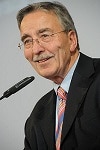
STIAS recently hosted an international workshop “The Impact of Foreign Experts on Developing Democracies” which brought together high-level government officials, donor representatives and academics from South Africa and Tanzania to discuss the intricacies of knowledge transfer in developing democracies.
The workshop took place on 4th October 2013 and served as an occasion to present findings of a study carried out at Bielefeld University (Germany) in collaboration with the Centre for Research on Evaluation, Science and Technology (Stellenbosch University). Under leadership of Prof. Peter Weingart, the research project investigates advisory processes in the context of aid. Thereby, it compares South Africa and Tanzania in three policy fields, namely health, environment and education. The findings are based on 73 expert interviews conducted in 2011-2013.
Fourteen delegates from both countries were invited to provide critical feedback and to reflect on challenges in dealing with policy advice provided to governments by international organisations. The participants highly appreciated the workshop as an “eye-opening exchange”, as one put it, and an outstanding opportunity to share experiences across countries and sectors.
As the study shows, sectors considerably differ in terms of the extent to which the policy processes are influenced from outside. Following an introductory presentation which picked out the impact of foreign experts on agenda-setting as central theme, delegates reported and compared sector-specific challenges which led to an insightful discussion about ways of receiving and dealing with expert advice.
In the second part of the workshop, the research team presented general obstacles which hinder knowledge transfer in the context of development cooperation. Among the implications which result from the linkage of aid and interests, discussants particularly confirmed shifting political priorities on donor side as major problem for recipient institutions.
The final session highlighted the unequal setting of policy advice in the aid context: in addition to political and financial power asymmetries which shape the relationship between donors and recipients, the study traced a hierarchisation of expertise in the realm of development cooperation. Procurement practices and deployment conditions prevailing in the aid community marginalise experts in African countries instead of strengthening them. Several delegates from both South Africa and Tanzania reported personal experiences in which the implicit downgrading of local expertise becomes obvious.
For the participants, the finding that such structural challenges are experienced across sectors and countries was striking. Many expressed the wish that the workshop could find a continuation of some kind. The fact that both the research team and delegates very much profited from the exchange at STIAS indicates that the findings of the study not only contribute to the academic debate, but are highly relevant to donor organisations and aid receiving governments in Africa.
The workshop was jointly funded by STIAS through a grant from the Swedish Riksbankens Jubileumsfond, an independent foundation with the goal of promoting and supporting research in the Humanities and Social Sciences, and by CREST.
Caption: Prof. Peter Weingart speaking at the workshop
